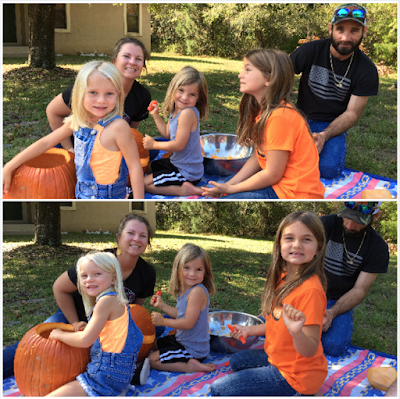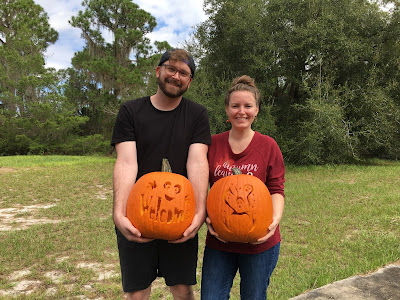 It's the last day of 2020.
It's the last day of 2020.
Let's all just sit for a minute and appreciate that.
I don't have to go into detail about any of the ways this year has been an absolute dumpster fire, but I do want to remember a few of the sweetest things that happened this year.
***
- I got to spend time with every single member of my family this year. Seeing as my siblings are spread out all over the globe and two of them are actively serving in the military, this one's a big deal for me.
- My husband stayed healthy working in the ER all year, AND in November he began an awesome new job at the hospital he works at which is an answer to a prayer we've been praying for two years.
- My husband and I also celebrated eight happy years of marriage in May, and The Melting Pot opened back up for business just in time for us to have our traditional anniversary date.
- My newest nephew was born healthy after a safe pregnancy, and despite all the travel restrictions I was finally able to travel to Germany to meet him. (I'm here now!)
- I instituted weekly one-on-one dates with my four nieces who live near me and we've had the funnest times together.
- My dad retired as the senior pastor from our church of 25 years, and even though this is a bit of a mixed blessing, I'm so thankful our church has already found a new senior pastor we love and the transition has been good. I'm also happy my parents are so happy with their new place in life. Even though they left me.
- One of my brothers moved back to Florida after being away from us for a long time.
- In April, I had a five-day slumber party bash reminiscent of our middle school days with three of my best friends. Even though we didn't get to go on the trip we'd been planning for a year, we had the absolute best time with our revised 2020 version of events.
- I surprised my sister who lives in Oklahoma by showing up on her doorstep on her birthday.
- My sisters and I started a book club. How on brand is that??
- And I read a lot of really great books this year.
2020 will probably live in infamy forever, but when I look back at this insane year, these are the things I want to remember.
And since one of the things I want to remember is all the great books I read this year, let's get on to that.
My yearly book lists and end of the year recaps are my favorite posts on this blog and certainly the ones I reference the most often. This year,
my 2020 book list consisted of 21 books and I said in my first post of the year that I'd be aiming to read 24 books. I didn't get to five of the books on my list, but I ended up reading 41 books over all and that makes 2020 my second best reading year since I started tracking my reading back in 2015. (
2018 is still my best reading year ever.)
So what did I actually read this year? I'm so glad you asked.
Rainbow Valley by L.M. Montgomery (re-read) : completed 1/12
Always a pleasure to visit the Blythe family and an Anne book is always the perfect way to begin a new year.
The first John Grisham I've read since high school, and it made me want to revisit all my old favorites. (Which you may find me doing in 2021.)
Really excited for The Secret Garden after having finally read and loved this one. I think my sisters are going to read it with me in our new book club.
The Voyage of the Dawn Treader by C.S. Lewis (re-read; read aloud) : completed 3/8
My husband and I continued our read-aloud of The Chronicles of Narnia and finished the series which was certainly a welcome escape this year.
My favorite book of 2020. I was 100% delighted by this charming little book.
Looking forward to more Maisie Dobbs! My parents liked this first one so much that I ended up getting them the first six books in the series for Christmas.
Still stands as the most unputdownable book of the year.
The Silver Chair by C.S. Lewis (re-read; read aloud) : completed 5/6
This one and The Last Battle were ones my husband had never read before so it was really fun reading these to him.
Of Mess and Moxie by Jen Hatmaker : completed 5/15
Not impressed. But her letter to her parents really resonated with me, and I loved that part of the book.
Farmer Boy by Laura Ingalls Wilder (re-read; read aloud) : completed 5/27
Very pleased at how this one lived up to the hype.
So fun revisiting this one after more than 20 years. (Still hard to admit I'm old enough to say things like this.)
TOO LONG. I can't forgive Evans for that. But a friend gifted me Silas Marner for Christmas and I'm looking forward to reading one of her (much shorter) popular novels.
Kathleen Kelly did not steer me wrong.
The Last Battle by C.S. Lewis (re-read; read aloud) : completed 8/16
Get Out of Your Head by Jennie Allen : completed 8/18
First book I read with my sisters in our new book club, and we also did the corresponding Bible study. The book and the study were a little disjointed, but both were challenging and the process of going through them together helped my sisters and me deepen our relationships with one another.
Excellent. No surprise it's a Pulitzer-winner.
Not so much a tragedy, but
thank goodness because I don't know if I could have handled a tragedy on the level of
King Lear or
Othello at this point in 2020.
I think this was the best choice for my proper introduction to Piper.
Favorite nonfiction book of the year.
THE book to read in October. This was my choice for our sister book club.
Still heartbroken over that beautiful dedication.
Loved my first Dahl books this year and very much looking forward to a deeper dive into more next year.
This novel truly solidified my love for Anne Brontë. She's my favorite and deserves at least as much recognition as Charlotte and Emily.
My favorite presidential biography (and president!) to date.
Lyndsey's choice for our sister book club.
The book I probably had no business reading this year (because I snatched it out of a Little Free Library even though I already had a book with me) but I'm glad I did anyway.
Recap coming soon. Just couldn't quite pull it all together before the holidays, but suffice it to say: this book certainly helped me keep a proper perspective in the midst of 2020.
Robert & Elizabeth Barrett Browning: Selected Poems : completed 12/20
Thanks to
Whitney at The Unread Shelf and her
Unread Book Bingo, I read my first complete book of poetry. I have a couple different shelves full of poetry at my house, and I have the best intentions to read them, but my approach to poetry thus far in life has been to read a random poem here and there.
The Passions of Andrew Jackson by Andrew Burstein : completed 12/28
Interesting follow-up to the biography by Brands. Burstein attempted to reveal Jackson's psyche, and while I didn't agree with all of his conclusions, it was interesting to see the way a different author attached more significance to certain details of Jackson's life that another author hardly mentioned at all; and overall, my admiration for Jackson remained fully in tact—possibly even increased.
One Crazy Summer by Rita Williams-Garcia : completed 12/31
Not quite done with this one, but I'll definitely finish it today and a recap is coming soon!
As I mentioned in
my Roald Dahl recap, 2020 turned out to be The Year of the Children's Classic for me, and that really seems perfect given all the craziness we've endured. Even though I've felt overwhelmed and distracted
a lot this year, looking back on the books I read is somehow grounding and comforting. I'm really looking forward to reading more next year. My plan is going to look a little different so I hope you tune back in for that post.
As always, I'd love to hear about what YOU read this year, and I'd especially love to hear some of the GREAT things that were part of your life in 2020. And if you're feeling discouraged or alone, please feel free to drop me a line via the Contact Me! box on the right side of the screen (scroll down and enable the "Web View" if you're reading from your phone). I would love to chat with you.
Keep on Keeping On & Keep Reading the Best Books First!
 Alright, I'm just going to say it: I loved this book. This book is easily in my top five favorite books for 2020 and certainly my favorite nonfiction book for the year.
Alright, I'm just going to say it: I loved this book. This book is easily in my top five favorite books for 2020 and certainly my favorite nonfiction book for the year. 
























